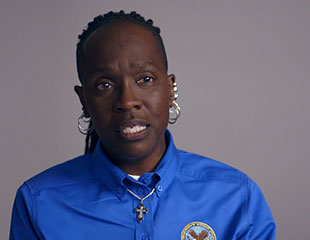“I Did It. You Can Do It Too.”
4-minute read
“I Did It. You Can Do It Too.”
4-minute read
When she sits down to help other Veterans, La Wanda likes to start by telling her story.
“I will fully disclose anything and everything about me when it comes to helping another Veteran,” she says.
So the U.S. Navy Veteran will share her journey — the one that’s taken her from partying, to substance misuse, to an other-than-honorable discharge, to battles with addiction and anger. She finds that it helps to break the ice and chip away at any walls that someone else might be putting up.
“Sometimes, it’s almost like you could see their demeanor change, and they’re like: ‘Wow. Why would a total stranger tell me that?’”
The answer: She needs the truth back in return. That’s how she can really help, as a mentor, as someone working with Veterans as part of a drug court team. That’s why she opens up.
Substance abuse is substance abuse. But we dealt with some unique things [as Veterans] that the rest of the general population can’t even begin to fathom. And we need people that can understand and acknowledge that, to help us, so we can get into recovery and stay there.La Wanda
La Wanda volunteers as a mentor on the drug court teams, which is designed to help Veterans who are facing legal trouble because of substance use and other mental health issues. They provide an alternative to jail time, offering support systems instead.
“The Veteran track is something that I firmly believe in because Veterans, you know, sometimes we’re prideful and we don’t want to admit that we need help. And a big thing that you have to do is you have to surrender — you have to admit you have a problem. And to surrender, for Veterans, is something we’re not going to do.”
For La Wanda, it took a friend to help her see that she had a problem.
This was years ago. She’d had a lot to drink the day before. And the friend told her: “You are no longer welcome in my home until you can do something about this. You know there’s help out there available, and you need to get it.”
The moment became a turning point.
“That was the thing that I had needed to hear, to finally make me stop,” she says. “I can honestly say that it’s the first that I had ever been told anything like that. And I knew that I didn’t want to live the way that I was living, but it took more than me knowing that I had a problem for me to get there.”
La Wanda has been sober for about seven years now.
She found success in a 12-step fellowship program. It was important, she says, to not just change her lifestyle, but to also change the way she thought — the way she viewed the things around her. She’s worked hard. She’s surrounded herself with other people who emphasize honesty, and open-mindedness, and a willingness to help others.
And in that way, she says, there are parts of her journey that she doesn’t regret, because it brought her to a place where she is open and eager to help others.
“All Veterans that suffer from a disease — that think they’re alone — I need them to know they’re not alone. They’re not alone,” she says. “We let them know, ‘Hey, I did it. You can do it too.’ So it’s probably one of the most gratifying, fulfilling things I’ve ever done.”

